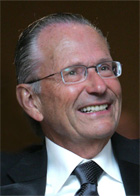
By Andrew Cohen
True, the latest U.S. Supreme Court term produced less drama than last year’s headline-grabbing decisions on gay marriage, voting rights, and DNA evidence. Still, Berkeley Law professors and high court experts Jesse Choper and Daniel Farber believe some of the recent rulings will have a notable impact on American life.
Choper, who clerked for Chief Justice Earl Warren ’14 and has taught at Berkeley Law since 1965, will give another of his popular presentations on the Court’s latest major decisions at Berkeley Law’s annual Alumni Weekend on September 20.
“Reading the reviews of this term, I must say they’re greatly oversimplified,’’ he said. “My aim is to provide a realistic look at what this term tells us about narrowly-divided courts and to offer a careful appraisal of the constitutional issues involved.”
Among the cases Choper will examine is Burwell v. Hobby Lobby, where the Court ruled that an Oklahoma-based retail chain was exempted from including coverage for certain contraceptives in the federally mandated health insurance it provides to employees. The multi-layered case deals with freedom of religion, reproductive rights, and corporate personhood.
Progressives have blasted the 5-4 ruling, saying it gives corporations—to women’s detriment—religious rights that have been and should be reserved to humans. Critics fear the ruling opens the door to companies not extending health care benefits to employees for any number of reasons, including having a same-sex spouse or domestic partner, based on religious beliefs.
“I expect a lot of political controversy and many efforts to exploit the Hobby Lobby decision in litigation, seeking exemption from a broad range of laws,” Farber said. “In the longer run, I think the courts will find ways to limit the impact of the decision.”
In the majority opinion, Justice Samuel Alito wrote that the ruling deals solely with contraception and applies only to companies “owned and controlled by members of a single family.” Choper noted that the case involved ‘closely held’ corporations and that few large corporations are exclusively owned by one group of people.

One of 19 national legal experts tapped by Politico for their views on the Court’s recent term, Farber noted that “there was a clear trend toward a country that looks a little less like Barack Obama’s America and a little more like Mitt Romney’s. This is an America where corporations have the right to religious freedom, public employee unions have fewer rights to collect dues, the EPA has a little less power to regulate greenhouse gases, and wealthy donors are subject to fewer constraints on their political contributions.”
However, Farber stressed the importance “not to caricature judges in terms of political ideology. Judicial decisions are a lot more complicated than that. Within the more conservative members of the court, we seem to be seeing Chief Justice Roberts and to a lesser extent Justice Alito pursuing more nuanced outcomes than Justices Scalia and Thomas. Justice Scalia is obviously extremely frustrated by this development. But on any given day, any of these Justices can always surprise.”
In addition to Hobby Lobby, Choper will use his Alumni Weekend presentation to discuss cases that deal with the reach of presidential power in making recess appointments, campaign finance regulations, and police searches of cell phones after an arrest.
In two companion cases, the Court held unanimously that police may not examine a cell phone without a search warrant—even though there exists a general exception for searches related to a lawful arrest. “It doesn’t apply to cell phones because of the enormous amount of private information they contain,” Choper said. “As for recess appointments, it’s the first time in our history they’ve been part of a Supreme Court case. The Court delved into what and how long a recess is, which will influence how presidential appointments can be made going forward.”
To Farber’s view, the campaign finance case (McCutcheon v. Federal Election Commission) will also have a far-reaching effect on the political process. “It’s another step toward increasing the political clout of the wealthy, building on earlier decisions by the same Justices,” he said. “That will affect the makeup of Congress for decades.”